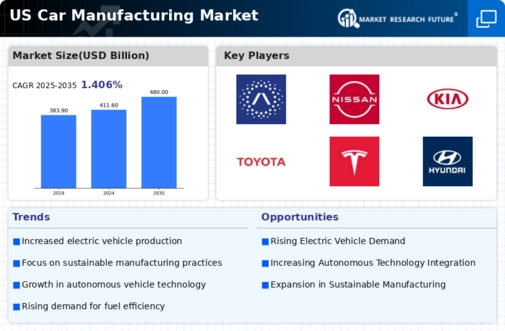The US Car Manufacturing Market is characterized by intense competition, as it comprises numerous players vying for market share through innovation, production capabilities, and strategic partnerships. Over the years, regulatory changes, shifts in consumer preferences, and technological advancements have reshaped the landscape, prompting manufacturers to adapt quickly. Companies are increasingly focusing on sustainability, electrification, and advanced safety features to meet the rising expectations of environmentally conscious consumers and stringent government regulations.
The market is also experiencing a trend toward automation and digitalization in the manufacturing process, enhancing efficiency and reducing costs. With a diverse range of offerings spanning sedans, SUVs, trucks, and electric vehicles, the competitive dynamics within this sector are constantly evolving, influenced by both domestic and global economic conditions.Stellantis holds a significant position within the US Car Manufacturing Market, emerging from the merger of multiple legacy automotive brands. This strategic union has enhanced its product portfolio and manufacturing capabilities, allowing Stellantis to offer a wide range of vehicles that cater to various consumer segments.
The company leverages its strengths in engineering and design to create vehicles that resonate with American consumers, particularly in the growing utility vehicle segment.
Stellantis benefits from a robust distribution network and strong brand loyalty, which enables it to maintain a competitive edge. Furthermore, its commitment to electrification and innovation positions it well for future growth as consumer preference shifts towards cleaner transportation options. The scalability of its production processes combined with a strong emphasis on research and development serves as crucial advantages in a market that prioritizes technological advancement and sustainability.Nissan, with its established presence in the US Car Manufacturing Market, has long been regarded for its innovative vehicle lineup, which emphasizes efficiency and technology.
The company offers a diverse array of vehicles, including popular sedans, versatile SUVs, and a growing number of electric vehicles, catering to the needs of various consumer demographics.
Nissan's strengths lie in its production capabilities, strategic partnerships, and the ability to invest in research and development for new technologies. The company is actively pursuing mergers and collaborations that enhance its operational efficiency and market reach, allowing it to remain competitive in a landscape marked by rapid change. Additionally, Nissan has made significant strides in autonomous driving technology and connectivity, aligning with evolving consumer expectations. The focus on sustainability, complemented by its robust supply chain management, bolsters its market presence, reinforcing its commitment to meeting both regulatory requirements and consumer demand for environmentally friendly options.
















